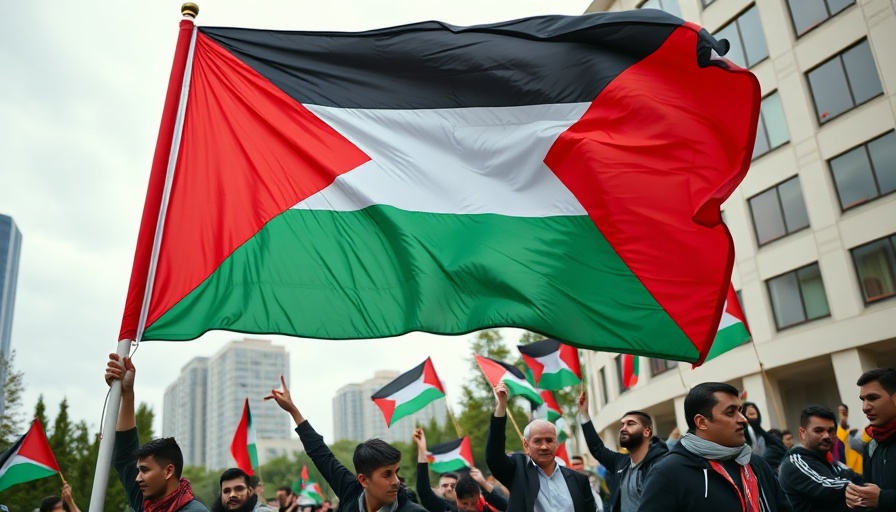
The Controversial Arrest of Pro-Palestinian Activists: A Growing Trend?
In a notable escalation regarding political speech and protest, the recent arrests of two individuals involved in pro-Palestinian demonstrations at Columbia University have stirred significant turmoil both on campus and across the nation. The second individual's apprehension involved a Palestinian woman who overstayed her student visa, subsequently leading to her arrest by Immigration and Customs Enforcement (ICE) agents. This move by federal authorities aligns with the ongoing crackdown on student activism as part of an extensive immigration policy under the Trump administration.
The Context of Protests at Columbia University
Columbia University's campus last spring was a hotbed of activity, witnessing intense protests against Israel's actions in Gaza. These demonstrations attracted a wave of student participation, particularly amongst Palestinian activists who were vocal about their grievances concerning U.S. foreign policy and its implications. With rising anti-Semitism and a pushback from pro-Israel groups, universities like Columbia found themselves at the intersection of escalating tensions, becoming sites for fervent political expression.
The First Arrest: Mahmoud Khalil's Detention
Leading the charge of recorded arrests is Mahmoud Khalil—a Palestinian refugee and former graduate student at Columbia—whose detention has been marked by controversy. Khalil was cited for allegedly leading activities that aligned with groups labeled as terrorist organizations, particularly Hamas. His situation exemplifies the thin line between political activism and legal consequences as ICE now views involvement in such protests as grounds for immigration violations. The chilling effect on other student activists cannot be understated, as many fear repercussions for vocalizing dissent.
Federal Actions Against Campus Activism
The reasons behind these federal actions raise questions about the wider implications of protesting on college campuses. As noted by various reports, including statements from Secretary of State Marco Rubio, the Trump administration has launched initiatives targeting supporters of anti-Israeli sentiments, even threatening to revoke visas of those labeled as radical activists. This strict posture also highlights a growing trend of federal oversight into the activities of universities regarding political engagements.
What This Means for Student Activism
The arrests signal a profound move towards silencing dissent and could lead to self-censorship among activists. The administration's actions towards Khalil and others underscore a desire to set an example and discourage similar demonstrations. Discussions linger among student bodies whether the stakes of participating in protests outweigh the potential fallout, from legal struggles to the loss of educational opportunities.
Legal Implications of Political Dissent
As the legal landscape shifts further towards punitive measures for political expression, questions arise regarding the constitutionality of such actions. Organizations like the American Civil Liberties Union advocate for individuals like Khalil, suggesting that these arrests are not just a violation of immigration laws but a significant hitting of the civil rights of students advocating for their beliefs. This unpredictable territory raises essential discussions about free speech and the limits governments may impose on it.
Ties to Broader Immigration Policies
The immigration policies under the Trump administration reveal an expansive strategy that aligns with domestic political agendas. The targeting of individuals, particularly from marginalized communities, directly connects to U.S. responses to international crises, often inferring that those expressing pro-Palestinian sentiments align with terrorism. This narrative enflames pre-existing prejudices and fears while complicating the broader immigration narrative in the U.S.
The Role of Universities Amidst Controversy
As Columbia University navigates this increasingly charged environment, the institution faces pressure from various sides—from federal authorities threatening funding cuts to internal pressures to address campus climate around free speech and anti-Semitism. Striking a balance between maintaining a safe space for student expression and appeasing federal mandates remains challenging for university administrators.
Calls to Action and Future Implications
With students rallying in defense of Khalil and others, advocacy groups are pushing for a critical reassessment of immigration laws targeting protesters. As activism evolves in the U.S., it is crucial for citizens and lawmakers alike to take heed of the implications that a crackdown on dissenting voices poses for democracy and civil rights. Continued vigilance and support for pro-Palestinian activism could reshape how future generations engage in advocacy and activism.
Under such weighty circumstances, it is imperative to remain informed about the ways immigration and activism intersect. Engaging in dialogue about these issues not only amplifies marginalized voices but also fosters a community bolstered by empathy and understanding.
 Add Element
Add Element  Add Row
Add Row 



Write A Comment